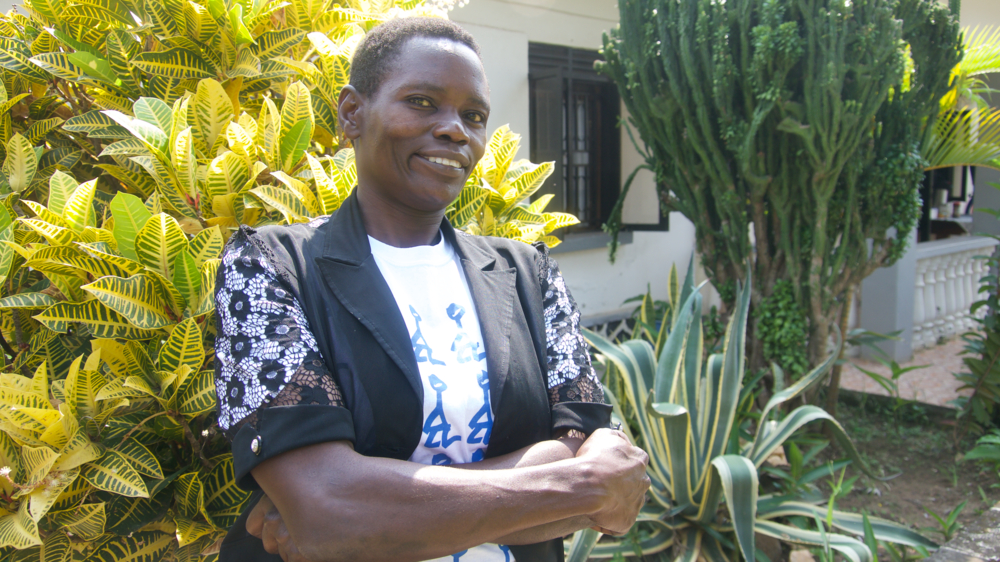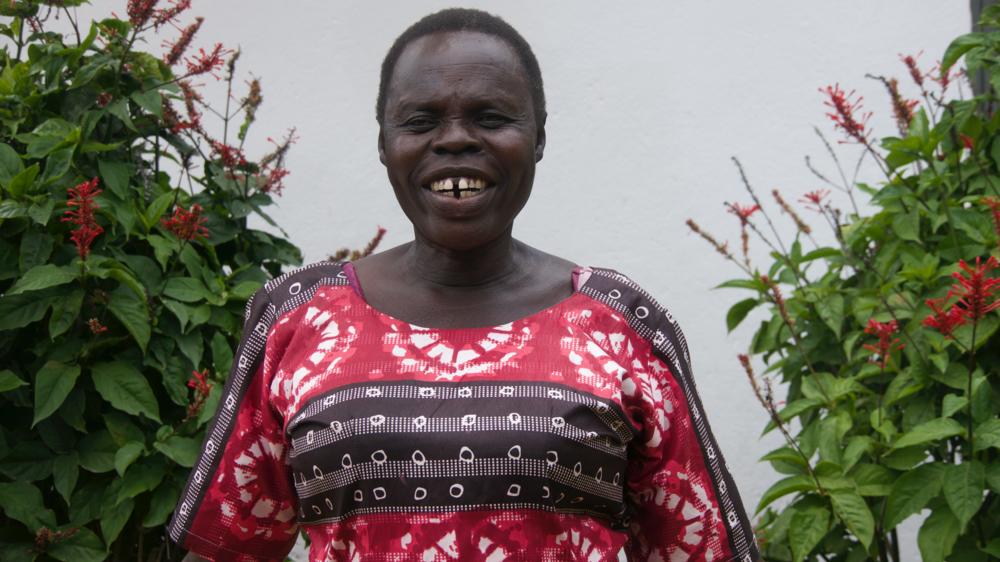For over 20 years, MSF has supported the Ministry of Health with treatment for HIV/AIDs patients free-of-charge, in the West Nile region of Uganda and more specifically, in the Arua district. Together, MSF and the District Health Services have been constantly reviewing the strategy to care for the most vulnerable and helping to introduce various innovations in disease management, such as antiretrovirals (ARVs), specific care for children and adolescents, peer support groups and point-of-care laboratory analysis. Overall improvement in living conditions of people living with HIV now allows MSF to fully withdraw from the program, handing it over to the Ugandan health authorities and their partners.
In 1999, Médecins Sans Frontières started supporting local health authorities and the hospital management team of Arua Regional Referral Hospital (ARRH), in the northwest of the country, to prevent mother-to-child HIV transmission.
Three years later, MSF established one of the first antiretroviral (ARV) therapy programs in the country, initiating ARV treatment for all HIV-positive patients in need in Arua District, with a total population of 830,000 people. At the time, there was no free-of-charge treatment accessible for those who received a positive HIV diagnosis, making medicines unaffordable for most of the population. Coupled with widespread lack of knowledge and misconceptions about the disease, this resulted in a high level of stigma and exclusion from communities for HIV-positive people.
Being diagnosed with HIV was often equivalent to announcing a near and certain death. Helen Candiru, a 64-year-old former MSF patient who has been living with HIV for 33 years, recalls: "In 1990, when I was diagnosed, the stigma was too great. There was no medicine for the virus, it was only death. So, you go and prepare yourself with your church people. I bought a goat. I bought a duck. I told my children, ‘They are saying there is no medicine for HIV so this goat I have bought—when I am dead, cut it for the community. The duck you cut for the reverends who will come to bury me'. "

The introduction of free ARVs by MSF in the region of Arua was a true game-changer in patient’s lives. Our teams were also involved in the treatment of opportunistic infections such as cryptococcal meningitis, tuberculosis and multi-drug resistant tuberculosis. Wadri Fennahas, now 65 years old, became a patient in those days: “At that time the Ministry of Health was not really having any of these ARVs. And the only service was MSF that was actually providing everything - even the normal drugs for other diseases. The Ministry had very few. Sometimes you get shortages here and there, but MSF was actually filling the shortages.”
To complement the medical assistance provided through diagnosis, treatment and follow-up, MSF soon accompanied its medical care with extensive psycho-social support, including peer counseling, outreach and home visits to help patients and inform family members about the disease and the necessity of their continuous support. Indeed, the stigma associated with being HIV-positive, and the fact that ARVs still had strong side-effects were barriers to taking treatment regularly; which is key to survival. Several patients, among them Helen Candiru and Wadri Fennahas, but also Lucy Adiro, were then recruited by MSF as health educators or peer counsellors to provide information about the disease and treatment in the communities. They also played a role in helping patients fight stigma, meet up, support each other and exchange information on therapeutic education.

According to Lucy Adiro: “The psychosocial support MSF gave to patients is even more than the medication it was giving to us. Without psychological support, the medicine you are taking is useless. We used to be in HIV support groups. You’d go to such a person’s home if the person is sick, you fetch water for that person, you bathe the person, you feed the person, you clear the environment where the person is, and then the person also starts feeling that impact— ‘I am also having people.’ That is another support we give to the patients.”
It was only in 2004 that ARVs became free in the country from the health authorities, but with limited access and recurrent stock-outs. From 2005 to 2010, MSF promoted the decentralization of HIV care in four sites, in collaboration with the District Health Services: Koboko, Adjumani, Nebbi and Yumbe, especially through training and mentoring of health staff. At the time in Uganda, only doctors were able to prescribe ARVs in large hospitals. The objective was to enable smaller health centers, closer to the patients’ homes, to provide treatment and management of HIV.
In the same vein, it was in 2013 that MSF introduced the first point-of-care (PoC) viral load blood-testing, performed at the site of patient care, as opposed to sending samples to a central laboratory (and getting results months after), with a same day result to facilitate rapid detection of treatment failure and swift medical response thereof.
As ARV treatment became more accessible in the country, and diagnostic and treatment facilities developed, MSF gradually transferred patients to their closest peripheral health center and focused its support on the most critical patients. This included those suffering from second-line treatment drug failure in need of an expensive genotyping test and eventually in need of a third-line treatment not yet available in Uganda. MSF also kept caring for children and adolescents, and patients with advanced HIV diseases.

Fred Econi, MSF medical team leader in Arua and member of the medical team since 2006, remembers the creation of the first MSF groups dedicated to children: “’Safe Haven’ was created because of the orphans, the children that were diagnosed with HIV as early as six months old. They grew with MSF in the program. As part of the different social networks among the different age groups, we thought we should have a group for children.” The creation and implementation of a specific approach for children and adolescents, first with Safe Haven and then in collaboration with the organization Maisha – that was created by former young patients from Safe Haven who became adults, enabled better adherence to treatment. Teenage patients were invited on Saturdays to attend a day of activities such as football, games, icebreakers and free food and health education with peer counsellors. Jordan Opileni was one of the founders of Maisha. He says: “That is when I started knowing that we are not alone. We have a group of people who are like us. Hope started coming in slowly. Mostly it has helped in dealing with acceptance, which is the highest thing someone [HIV-] positive faces every day. Without acceptance, you will not see the use of medication: without the use of medication, you will not see the use of life. It has really helped with acceptance.”
More than 20 years after initial MSF support to people living with HIV in Arua, huge progress has been made in terms of HIV medical treatment. Increased knowledge and better clinical management, along with better acceptance both from the patients and the community – even if some stigma remains, has enabled significant progress towards the UNAIDS 95-95-95 strategy . According to the latest Uganda population-based HIV impact assessment in 2020-2021, 80.9 per cent of the Ugandan population knew their HIV status, 96.1 per cent of whom were on ARV therapy, and 92.2 per cent of whom had their viral load suppressed. At this stage, the patient's immune system is strengthened, and the risk of transmitting HIV infection is considerably reduced. More people now live with HIV in the country: 1,400,000 people in 2022, according to UNAIDS, while there were 530,000 in 2003. This is explained through more awareness, more testing and lower mortality from the disease: 14,000 people died from HIV/AIDS in 2022 versus 78,000 in 2003.
Innovations mainly in models of care and support brought by MSF, in collaboration with the Ministry of Health, to Arua district over the years are now part of the general national strategy for diagnosis and medical care of people living with HIV in the country.
Even while MSF ends its support to this HIV program, we remain present in the country to respond to emergencies (epidemics, population movements), and also in the district of Kasese, where we run a specialized center for adolescents aged 10 to 19 years old, since 2015, in collaboration with the District Health officials. This project enables adolescents to benefit from medical care adapted to their specific needs, particularly in terms of sexual and reproductive health, with a particular focus on pregnant adolescents, HIV treatment and care, sickle cell anemia, social support and mental health.
